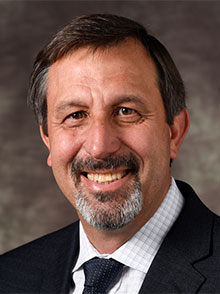UF researchers are exploring new approaches to sepsis detection and treatment
Sepsis is the culprit for one in five deaths worldwide according to the World Health Organization. It is critical for health care providers and patients alike to be aware of sepsis to prevent fatalities and improve health outcomes for patients.
Sepsis is the body’s response to an infection. When sepsis is not recognized early and managed promptly, it can lead to septic shock, multiple organ failure and death. According to the Centers for Disease Control and Prevention, 80 percent of adult patients with sepsis started having signs and symptoms prior to being hospitalized. In addition to challenges in seeking care caused by COVID-19, there are numerous disparities which cause underserved populations to be disproportionately affected and increase the likelihood of hospital readmissions.
Together, researchers at the University of Florida College of Medicine – Jacksonville are working on improvements to the current standard of care for sepsis to help improve early detection, diagnostics and treatment being used in hospitals across the U.S.
Early and Appropriate Treatment
“Previous research has shown that race, socioeconomic status and urban residence are among the factors resulting in sepsis readmission,” said Elizabeth DeVos, MD, MPH, associate professor of emergency medicine.
Data by the Centers for Medicare and Medicaid Services showed that 30-day unplanned readmissions after sepsis comprised the greatest percentage of hospital readmissions (12.2%), resulted in longer lengths of stay and had a higher mean cost per readmission than many other common medical conditions, such as heart failure and emphysema. DeVos is using a UF Dean’s Faculty Grant to study patient-level factors related to hospital readmissions for sepsis at UF Health Jacksonville. Early and effective interventions related to patients’ social determinants of health could impact these outcomes and improve the health of patients.
She is also the principal investigator on an Inflammatix study evaluating the diagnostic test, HostDx Sepsis in emergency room patients with a suspected sepsis infection. The test is being used to determine the severity and type of sepsis — bacterial or viral — through collection of biological samples upon enrollment. This multicenter observational study aims to assist physicians in treating septic patients more appropriately in the future.
New Innovations in Sepsis Care and Management
Faheem Guirgis, MD, FACEP, an associate professor of emergency medicine, is building on his previous work with sepsis as the principal investigator for the LIPid Drug Therapy for Sepsis, or LIPIDS-P. LIPIDS-P is a Phase II pilot clinical trial focused on the role of cholesterol levels in septic patients.
For partially unknown reasons, cholesterol levels drop to critically low levels in early sepsis, leaving the body unable to protect itself as it normally would using cholesterol reserves. LIPIDS-P proposes to assess patients to measure the safety of the IV infusion of Smoflipid, a nutritional supplement designed to increase cholesterol levels. Researchers are looking at the infusion’s adverse effects, its ability to optimally elevate cholesterol at 48 hours, and preliminary clinical outcomes.
In another study funded by the National Institutes of Health R01 grant, the emergency medicine research laboratory, under the oversight of Guirgis, is investigating the role and mechanisms of lipid and lipoprotein dysregulation in septic patients. The analysis will help the team to better understand biological differences between patients who do well versus patients who do poorly after sepsis diagnosis. The overall goal of this grant is to identify lipid and lipoprotein differences that may later lead to novel treatments for sepsis.
Lauren Black, MD, MPH, an assistant professor of emergency medicine, received funding from an NIH KL2 award to for her retrospective study on vasopressor initiation in patients with septic shock. Vasopressors are medications used to increase and maintain blood pressure in patients with septic shock. Septic shock, the most severe form of sepsis, involves critically low blood pressure, or hypotension, which can lead to multiple organ failure and death. Hypotension can be treated with vasopressors.
However, the optimal timing of vasopressor initiation remains unknown. Black is using data from the OneFlorida Data Trust to analyze the relationship between the timing of vasopressor initiation, pre-vasopressor hypotension and downstream organ failure and mortality in patients with septic shock. The long-term goal of this work is to improve the evidence-based guidelines for septic shock management.
Additional investigators involved in working on sepsis studies in the department of emergency medicine include David Caro, MD, Phyllis Hendry, MD, FAAP, FACEP, Ashley Norse, MD, Andrew Schmidt, DO, MPH, Andrew Shannon, MD, MPH, FACEP, Sophia Sheikh, MD, and Deborah J. Williams, MD, MS.
“Our faculty are committed to striving to improve the standard of care for sepsis through the various studies currently underway at the Jacksonville campus,” said Steven “Andy” Godwin, MD, FACEP, a professor of emergency medicine and chair of the department of emergency medicine. “The underserved patient population we treat includes many of those affected by health care disparities and are often at greatest risk of complications and mortality due to sepsis. Recognizing this pressing need, our clinical faculty and researchers have a true passion to better understand how we can impact outcomes across all socio-economic barriers through cutting-edge practices and ongoing innovations in care.”
Featured Faculty
1251

Professor
Assistant Dean for Graduate Medical Education; Associate Chair, Educational Affairs, Department of Emergency Medicine
1481

Elizabeth L. DeVos, MD, MPH
Professor
Assistant Dean for Student Affairs; Medical Director, International Emergency Medicine Education
1392

Steven A. Godwin, MD, FACEP
Professor
Senior Associate Dean for Clinical Affairs; President and CEO, University of Florida Jacksonville Physicians, Inc; Chair, Department of Emergency Medicine; Assistant Dean, Simulation Education
1078

Phyllis L. Hendry, MD, FAAP, FACEP
Professor
Associate Chair of Research; Medical Director, EMSC Sate Contract
2588

Andrew C. Schmidt, DO, MPH
Associate Professor
2200

2223

Deborah J. Williams, MD, MS
Assistant Professor